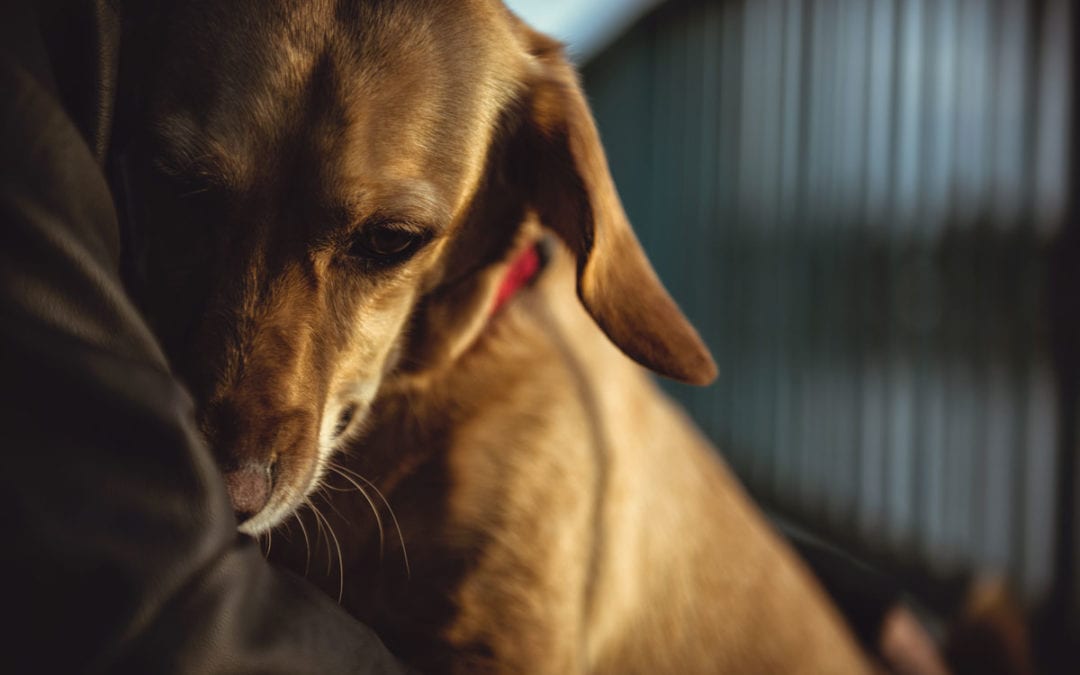Kaboom! Crackle! Clap! Sizzle! The sounds of summer are oftentimes ones of celebration and the coming of rain. Noise anxiety in pets means that the sounds of summer that exhilarate us–fireworks, thunderstorms–can be terrifying for our fur friends. Many pets suffer from a degree of noise anxiety, and some develop a full-blown phobia to loud and sudden sounds.
If your pet is afraid of loud noises, you are not alone. Noise anxiety in pets is a common issue that we help pet owners deal with here at Union Lake Veterinary Hospital. The level of anxiety can range from mild to severe. We are here to give you and your special pet tools to better cope with the sounds of summer.
Noise Anxiety in Pets
Noise anxiety is a serious aversion to loud sounds. The fear of the sound is so strong, it makes many pets try to get away from it, either to hide or run away. This response may seem extreme to us, but our pet companions don’t know what is causing the noise. Their hearing is much more acute than our own. Some loud sounds can be overwhelming to a pet’s physiology.
Common symptoms of noise anxiety in pets include:
- Chewing
- Drooling
- Panting
- Trembling
- Urinating/defecating in the home
- Lack of appetite
- Diarrhea
- Barking/vocalization
- Extended yawning
- Hiding
- Attempts to get away
This time of year can be worse for pets with this condition. Thunderstorms, with their giant thunderclaps, and the sizzles and pops of fireworks during the Fourth of July are two examples.
The triggers for noise aversion, though, can be one or many of the following types of sounds:
- Thunder
- Fireworks
- Sirens
- Loud parties
- Music
- Horns
- Alarms
Notice how intense your pet’s reaction is to the noise. Are they briefly startled but then okay? The section below on lessening their fear should help. Is your pet deeply afraid? Noise aversion is a spectrum. For those on the more anxious end of the spectrum, you’ll want to speak to your veterinarian. No matter the reason for the anxiety and stress, we’ll help you get the right treatment for your pet. Let’s take a closer look.
Lessening the Fear
When your bestie is afraid, you naturally want to ease their worry. But how?
There are several ways we can treat your pet and address symptoms or responses to noise. The first and most obvious of which is to keep your pet from exposure to the triggering sound. This isn’t easily done when the sound is everywhere, such as during a thunderstorm.
After an examination with your veterinarian, we can recommend other options for your pet, such as calming treats, medications, or behavioral modification.
At home, implement the following noise and stress-reducing practices:
- Find a safe, secure place for your pet to be, such as a middle room where the noise is not as loud.
- Turn on a white noise machine, TV, or radio to mask the outside sound. Or select calming music or sounds (there is online music, apps, and CDs).
- Give your pet distractions, like a cherished toy, treats, or a Kong filled with peanut butter.
- Stay with your pet while the noise persists.
- Consider using a Thundershirt, designed to fit your pet’s torso snugly, and ease their anxiety.
- Pheromone sprays, like Rescue Remedy by Bach’s, are also a good choice to calm an anxious pet.
- Your doctor can also prescribe sedatives that are specific for noise phobias.
To reduce the risk of your pet running out of the home, shut all doors, gates, and windows. Your pet’s microchip is the key to reuniting you with them should they ever become lost.
For more information on noise anxiety in pets, or to schedule an appointment, please contact us.

